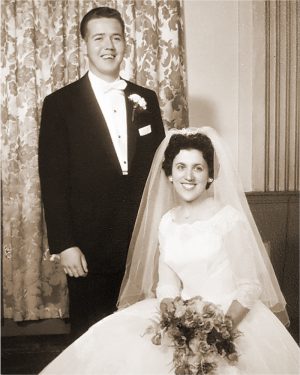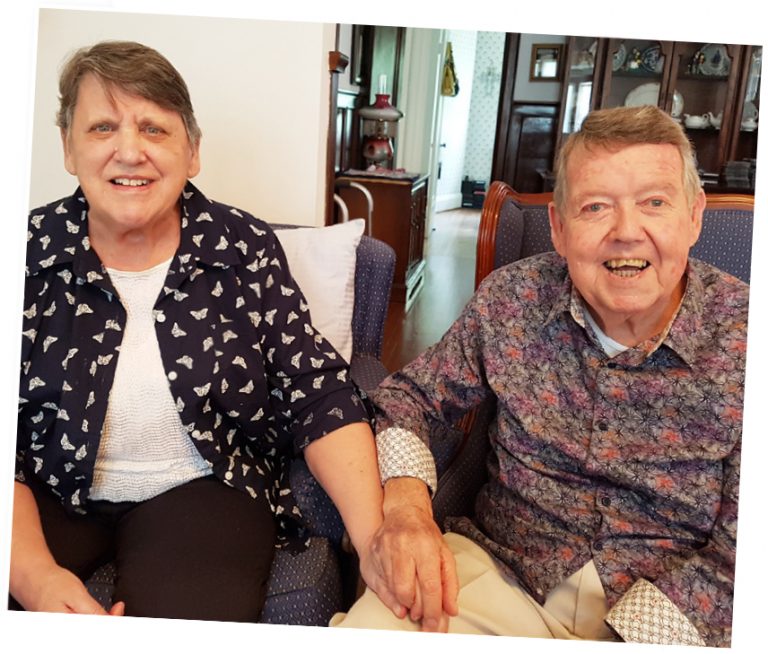Marion and Bill have been together for 61 years. They met on the dance floor, and after all these years still share a passion for travel and music. And like every good love story, theirs endures despite the challenges they may face. In Marion and Bill’s case, that challenge is aphasia.
In 2010, Marion, a retired director of nursing, and her husband Bill, a retired medical sales and marketing professional, started noticing that Marion was constantly repeating words and phrases. Concerned, they saw a neurologist and Marion underwent testing. Shortly afterward came the heartbreaking news:
“PPA. Primary Progressive
Aphasia,” the doctor told them.
And that was that. “There
was a finality to it,” Bill recalls.
Unlike other forms of aphasia, Primary Progressive Aphasia (PPA) is neurodegenerative rather than stroke- or injury-related. A PPA diagnosis means slow but progressive language impairment similar to Alzheimer’s disease, resulting from a deterioration of the brain tissue necessary for speech and language. While it tends to present later in life, PPA has been identified in people as young as 45 years of age. At first, it shows as an impaired ability to communicate similar to other forms of aphasia, but eventually symptoms such as memory loss begin to develop. Because people with PPA are fighting against a continued loss of language, they require an entirely different support approach.
Reflecting on this period, Bill says:
“The terminology was overwhelming,
coming at us from all sides. They tell
you what you have, but don’t tell you
what to do. It felt like a conclusion
with no indication that there’s a next
step at all. We knew that there had to
be more to life than this diagnosis.”
Marion and Bill did their own research and found the Aphasia Institute. And just as they had hoped, there was indeed much more to life than a diagnosis. Their first day at the Institute was an affirmation that everyone deserves to participate in life to the fullest extent possible. They both knew Marion’s condition would deteriorate over time, but with the Aphasia Institute’s support Marion and Bill’s hope began to grow.
The Institute created a special program for Marion and Bill that was specific to PPA, with the goal of keeping conversations alive for as long as possible. The Institute’s Speech-Language Pathologists and social workers helped ensure that the couple had a toolbox with a clear set of strategies they could use in their home and community. Marion also participated in conversation groups, a staple of the Institute’s program. This gave her a sense of belonging among people who understand aphasia – a welcome relief from what she and Bill quickly learned was an isolating, relatively unknown, and stigmatizing disease. Looking back, Bill says “those were happy days.”
After participating for a couple of years in program groups, Bill says they “slowed down a bit” and instead of going to the Institute itself, Marion was served by an Outreach Program volunteer who visited Marion and Bill weekly. As Marion’s care needs increased, a personal support worker was sent to their home to continue the service. It turns out this support worker had already been trained in the Institute’s conversation methods and was well equipped to help the couple. Bill says it was like having a friend or family member come to visit.
It was the quality of support throughout their journey that compelled Bill to pick up the phone years later simply to say “thank you” for educating them and others about aphasia so they could live their best lives.
Today Bill and Marion continue to live at home, surrounded by photos of their love story and the pictographic tools they use to help communicate with one another. They still enjoy listening to music and being in each other’s company. Holding hands and looking very much in love, it’s obvious they feel they have been lucky. Lucky to have had the journey they’ve had and to have lived their lives to the fullest. With a strong commitment to each other and support from the Aphasia Institute—and donors like you!—Bill and Marion’s inspirational love story has flourished despite Primary Progressive Aphasia.



